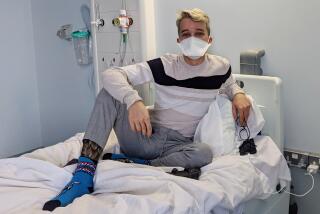Participation puts pride in their step
- Share via
Framingham, Mass., calls itself “the town that changed America’s heart.”
For 60 years, the town’s residents have returned again and again to be poked and prodded at the Framingham Heart Study offices -- though the exact address has changed a few times. Some have been coming every two years since 1948; now their children and grandchildren too offer their time and bodies.
“It’s a source of pride that it’s called the ‘Framingham’ Heart Study,” says Dennis Giombetti, 59, a member of the town’s board of selectmen and second-generation study subject since 1971.
In 2002, when the study recruited third-generation participants, grandkids were eager to sign up, says Dr. Daniel Levy, director of the study and a professor at the Boston University School of Medicine. “Believe it or not, every day we heard people say, ‘I’ve waited my whole life for this day to come.’ ”
Claire Hooper, of the first-generation group, joined the study because, “It was just a good idea,” says the retired schoolteacher, now 93 and living in nearby Hingham, Mass. She and her husband, worried about his family history of heart problems, hoped to get additional medical monitoring through the study.
When Hooper and 5,208 other Framingham residents -- about two-thirds of the town’s adult population -- signed up in 1948, the small blue-collar community 20 miles west of Boston was diverse, for the time, but nearly everyone was of European descent. Today, Framingham is less an individual town than one among many suburbs, transitioning seamlessly into Boston proper, where many citizens now commute to work. Modern Framingham hosts residents of Brazilian, African, Asian and Hispanic descent.
The Framingham Heart Study moves with the times. In 1994, in response to the new ethnic diversity, the study recruited a group of minorities such as African Americans and Latinos. Where researchers once crunched numbers on adding machines and IBM card sorters, they now use the latest statistical computer software.
Approximately 250 members of the original cohort -- the youngest of whom are in their 90s -- still participate. Some have retired to Florida or other parts of the world. If they can’t make it to Framingham for the biennial exam, the study sends staff to them.
Of the 5,124 second-generation participants recruited in 1971, only 10 have dropped out of the study.
That level of participation is “astounding,” says Dr. Philip Greenland, a cardiologist at Northwestern University Medical School in Chicago and member of the study’s monitoring board. Scientists often struggle to recruit and retain subjects when the research is of no direct benefit to participants. Yet Framingham’s subjects receive no drugs, no financial compensation -- nothing beyond a free checkup.
For the residents of Framingham, simply to participate is enough.
--




